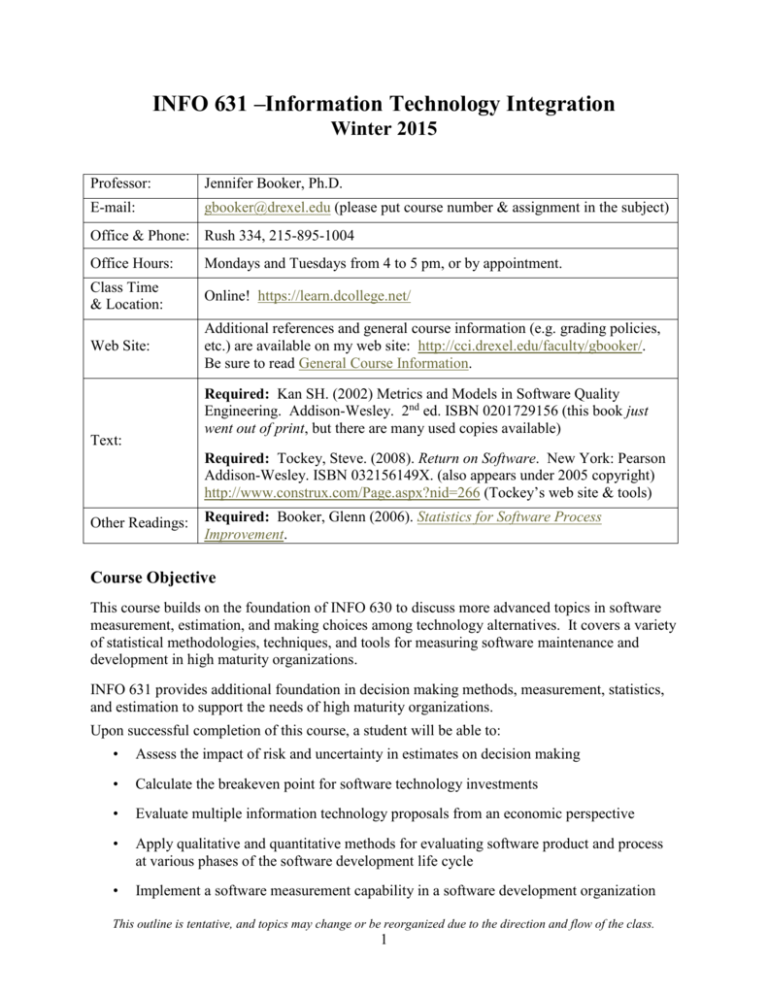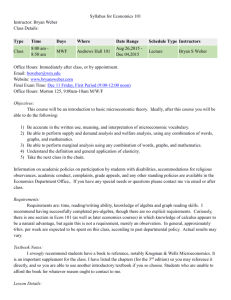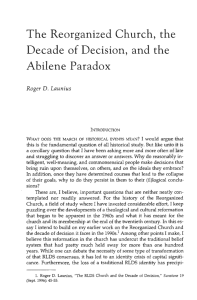
INFO 631 –Information Technology Integration
Winter 2015
Professor:
Jennifer Booker, Ph.D.
E-mail:
gbooker@drexel.edu (please put course number & assignment in the subject)
Office & Phone: Rush 334, 215-895-1004
Office Hours:
Mondays and Tuesdays from 4 to 5 pm, or by appointment.
Class Time
& Location:
Online! https://learn.dcollege.net/
Web Site:
Additional references and general course information (e.g. grading policies,
etc.) are available on my web site: http://cci.drexel.edu/faculty/gbooker/.
Be sure to read General Course Information.
Required: Kan SH. (2002) Metrics and Models in Software Quality
Engineering. Addison-Wesley. 2nd ed. ISBN 0201729156 (this book just
went out of print, but there are many used copies available)
Text:
Required: Tockey, Steve. (2008). Return on Software. New York: Pearson
Addison-Wesley. ISBN 032156149X. (also appears under 2005 copyright)
http://www.construx.com/Page.aspx?nid=266 (Tockey’s web site & tools)
Other Readings:
Required: Booker, Glenn (2006). Statistics for Software Process
Improvement.
Course Objective
This course builds on the foundation of INFO 630 to discuss more advanced topics in software
measurement, estimation, and making choices among technology alternatives. It covers a variety
of statistical methodologies, techniques, and tools for measuring software maintenance and
development in high maturity organizations.
INFO 631 provides additional foundation in decision making methods, measurement, statistics,
and estimation to support the needs of high maturity organizations.
Upon successful completion of this course, a student will be able to:
•
Assess the impact of risk and uncertainty in estimates on decision making
•
Calculate the breakeven point for software technology investments
•
Evaluate multiple information technology proposals from an economic perspective
•
Apply qualitative and quantitative methods for evaluating software product and process
at various phases of the software development life cycle
•
Implement a software measurement capability in a software development organization
This outline is tentative, and topics may change or be reorganized due to the direction and flow of the class.
1
Two Groups – ‘most folks’ and ‘SE students’
Depending on your background before this course (see handy table below), you will be in one of
two groups.
Your Situation
You’re a software engineering student, haven’t taken INFO 630,
and don’t plan to.
Everyone else, and have taken INFO 630
What to do
You’re in the ‘SE students’
group
You’re in the ‘most folks’
group
Why the two Groups?
The MSSE degree still requires INFO 631, but not INFO 630. It takes a long time to get degree
requirements changed!
Both groups will merge after the first six weeks of the term, and everyone will finish the course
together. Both groups will have the term project and assignments 4 and 5 in common.
People from both groups can work on the term project together.
Course Outline
Week
Monday
is
1
1/5/2015
2
1/12/2015
3
1/19/2015
4
1/26/2015
5
2/2/2015
6
7
8
2/9/2015
2/16/2015
2/23/2015
9
3/2/2015
10
11
3/9/2015
3/16/2015
Topics
Defect causal analysis, orthogonal
defect classification, defect removal
effectiveness; Rayleigh models
Reliability models; Customer
Satisfaction
Complexity & availability metrics
Software Testing, Object Oriented
metrics
Project Assessment and Process
Improvement
Measurement Tools and review
Break-even and Optimization
Estimation, Inaccuracy in Estimates
Decision Making Under Risk and
Uncertainty
Review
(Finals week)
Kan:
most
folks
Tockey:
everyone
Tockey:
SE
students
6, 7
-
1-3
8, 9, 14
-
4-6
11, 13
-
7-9
10, 12
-
10-12
15-17
-
13-15
19
-
19, 20
21-23
16-18
-
-
24-26
-
-
-
-
This outline is tentative, and topics may change or be reorganized due to the direction and flow of the class.
2
Course Assessment
INFO 631 Course Assessment
“Most folks”
“SE students”
Homework A
Homework B
Homework C
Project proposal
Homework D
Homework E
Homework F
Project WBS
Homework #4
Homework #5
Completed Project
Participation
TOTAL
Due Date Weight
Homework #1
1/20/2015
10%
Project proposal
Homework #2
1/31/2015
2/2/2015
5%
10%
Homework #3
Project WBS
Homework #4
Homework #5
Completed Project
Participation
TOTAL
2/16/2015
2/20/2015
2/23/2015
3/2/2015
3/19/2015
ongoing
10%
10%
10%
10%
20%
15%
100%
Due Date Weight
1/12/2015
5%
1/20/2015
5%
1/26/2015
5%
1/31/2015
5%
2/2/2015
5%
2/9/2015
5%
2/16/2015
5%
2/20/2015
10%
2/23/2015
10%
3/2/2015
10%
3/19/2015
20%
ongoing
15%
100%
Assignments are due at 11:59 pm Eastern time on the date cited. Submit assignments in one
Word or one PDF document on Blackboard. There are no tests, quizzes, midterms, or final
exam.
Course assessment is based on the homework assignments, term project, and participation.
Homework assignments are all to be done and submitted individually. General questions to
clarify the scope of the problems can be posted on Blackboard; more specific questions about
your approach to solving them should be emailed to me.
Homework turned in late will be penalized one letter grade per day, until the solution is posted.
Homework submitted after the solution is distributed will not be accepted. The solution for
homework assignments will be distributed and discussed a few days after the assignment is due.
Participation
In the weekly discussion forums, I’m looking for your thoughts about application of the subject
matter at hand. Since the class is split for the first six weeks, I generally won’t post an official
topic for the discussion boards. It’s up to you to respond to the material. Typical ways to
participate include:
Discuss ways you’ve already used the techniques described professionally, or speculate
on how you might be able to use these techniques in your work.
Describe other approaches you’ve used, or seen used, for achieving the same objectives
as the course material.
Ask questions to improve your understanding of the material. If you don’t ask questions,
I assume everything is perfectly clear. Please ask ‘really basic’ questions if needed – I
don’t expect you to be experts, and your classmates will be grateful for your initiative.
They were probably wondering the same thing!
This outline is tentative, and topics may change or be reorganized due to the direction and flow of the class.
3
Do a little research, and share more information sources on the topic(s) of the week, or
find examples where they are used in someone else’s work.
Respond to others’ comments – beyond the shallow (even if sincere) “me too” or “thank
you for sharing” feedback.
Feel free to answer each others’ questions. I claim no monopoly on knowledge.
It’s okay to start new discussion threads. In fact, please do so!
Questions to clarify the scope of the assignments are certainly fair game, too.
Try to avoid those at 11 pm on the day they’re due, however…
“Good” participation is posting a new thread once a week by Thursday, reading all of the
discussion posts, and responding meaningfully to at least two classmates per week by
Sunday. Excellent participation is substantially more than that.
I generally check and respond to the discussion board every day or two, often late at night. I will
read all of your posts, but I won't necessarily respond to every one of them. I don't live on
Blackboard, nor do I expect you to. If you have more urgent questions, email me. If I seem to
fall off the face of the earth, email me and see if I’m sick or something. Rare, but it can happen.
When in doubt, ask lots of questions!
Software
The statistics program PASW (formerly SPSS) may be used for this course.
You can download PC version 22 or Mac version 22 for free from https://software.drexel.edu/.
The user name is your DrexelOne login name (e.g. ‘abc12’); then your DrexelOne password.
Contact the IRT (215-895-2698) if you have trouble with the download process.
Thanks to Dr Peter Grillo for much of the Tockey course materials.
This outline is tentative, and topics may change or be reorganized due to the direction and flow of the class.
4








